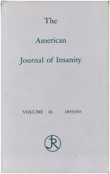Improvement of some schizophrenic deficit symptoms with low doses of amisulpride
Abstract
OBJECTIVE: The authors assessed the effects on primary negative symptoms of low doses of amisulpride, a substituted benzamide neuroleptic with high affinity for D2 and D3 dopamine receptors. METHOD: Young, drug-free schizophrenic patients with pure negative symptoms participated in a 6-week double-blind trial of placebo (N = 10) or low-dose amisulpride (N = 10). They were assessed with the Scale for the Assessment of Negative Symptoms. RESULTS: Amisulpride significantly improved negative symptoms. Improvement in avolition, attentional impairment, and retardation was significantly greater with amisulpride than with placebo. CONCLUSIONS: These findings suggest that some primary negative symptoms may be directly affected by low doses of benzamide neuroleptics.
Access content
To read the fulltext, please use one of the options below to sign in or purchase access.- Personal login
- Institutional Login
- Sign in via OpenAthens
- Register for access
-
Please login/register if you wish to pair your device and check access availability.
Not a subscriber?
PsychiatryOnline subscription options offer access to the DSM-5 library, books, journals, CME, and patient resources. This all-in-one virtual library provides psychiatrists and mental health professionals with key resources for diagnosis, treatment, research, and professional development.
Need more help? PsychiatryOnline Customer Service may be reached by emailing [email protected] or by calling 800-368-5777 (in the U.S.) or 703-907-7322 (outside the U.S.).



